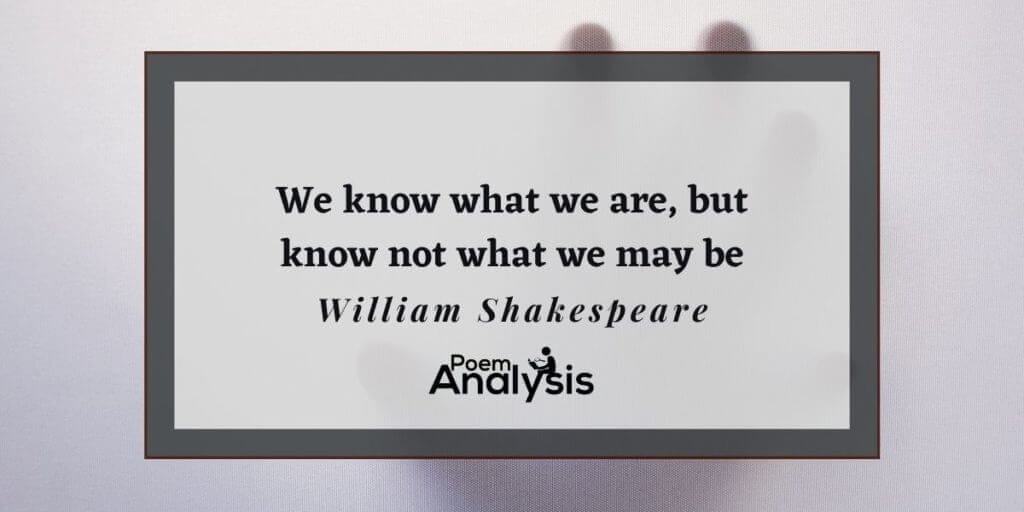The quote is commonly cited as an example of madness, as King Claudius interprets it, and as a great example of one of the most important themes of the play—uncertainty. Below, readers can explore the context of this famous line and what inspired Ophelia to speak it.
“We know what we are, but know not what we may be” Meaning
The quote “We know what we are, but know not what we may be” means that “we,” meaning the characters in Hamlet and Ophelia specifically, may believe they know who they are at the present moment, but that does not apply to the future. The future, or what “we may be,” is unknown. It’s impossible to know how events will influence how one’s life plays out.
Where Did Shakespeare Use “We know what we are, but know not what we may be?”
William Shakespeare uses this quote in Act IV, Scene 5. It is spoken by Ophelia to the King of Denmark, Hamlet’s uncle (and the man who the title character believes murdered his father). Here is the quote in context:
Well, God dild you. They say the owl was a
baker’s daughter. Lord, we know what we are
but know not what we may be. God be at your table.
Here, she is telling Claudius, the current King of Denmark, that she hopes he gets what he deserves in response to his inquiring into her well-being. She describes how the baker’s daughter was turned into an owl for refusing Jesus’ bread. The well-known line, “we know what we are / but know not what we may be,” comes next. Here, she is expressing her feelings of uncertainty regarding what the future holds. This is one of the most important themes in Hamlet and something that both she and the title character deal with.
Ophelia has just experienced the death of her father, Polonius, at the hands of Hamlet (who thinks he’s King Claudius). This death also leads to Claudius’ new fear for his future and Laertes, Polonius’ son and Ophelia’s brother, to seek his revenge. It’s at Polonius’ hand that Hamlet eventually loses his life.
Claudius interprets Ophelia’s words as madness alone, especially when she breaks into song in the following lines with the quote:
Pray let’s have no words of this, but when
they ask you what it means, say you this:
Tomorrow is Saint Valentine’s day,
All in the morning betime,
And I a maid at your window,
To be your Valentine.
Then up he rose and donned his clothes
And dupped the chamber door,
Let in the maid, that out a maid
Never departed more.
Claudius expresses concern over her well-being and, when she exits the stage, asks Horatio to keep an eye on her.
Why did Shakespeare use this Quote?
Commonly, this quote is referenced as an example of Ophelia’s declining mental state in Act IV of Hamlet. While the quote can be interpreted this way as nonsense speech about the future that has no real meaning, it’s also possible (and quite interesting) to consider the quote as it applies to the play as a whole.
All the characters, but particularly Ophelia and Hamlet, deal with uncertainty throughout the play. From the death of Hamlet’s father (and his interpretation of the ghost), his murder of Ophelia’s father, and Hamlet’s procrastination when it comes to his true revenge on Claudius. For example, when Hamlet finds Claudius praying and determines that if he dies while at prayer, he’ll go to heaven. So, he decides to kill him later.
FAQs
The line is spoken by Ophelia in William Shakespeare’s Hamlet. It appears in Act IV, Scene 5, and is used to describe the uncertainty of her future and the other characters’ futures in the play.
The quote means that we may know or believe we know who we are at the present moment, but the future is unknowable. It’s impossible to know how events will influence one’s life and transform their morals, personality, and intentions.
At various points throughout the play, Hamlet expresses uncertainty. This starts with his uncertainty in regard to the identity of the ghost at the beginning of the play and his unwillingness to commit to actually following through with his revenge on King Claudius.
Other Quotes from Hamlet
- “Brevity is the soul of wit” – one of William Shakespeare’s better-known quotes. The Bard used it in the tragedy Hamlet, written around 1603.
- “Frailty, thy name is woman” – a well-known line from Hamlet’s first soliloquy in William Shakespeare’s Hamlet. It appears in Act I, Scene 2.
- “Get thee to a nunnery” — from William Shakespeare’s Hamlet. It appears in Act III, Scene 1.
- “The lady doth protest too much, methinks” – a famous quote used in Shakespeare’s Hamlet. It is spoken by Queen Gertrude.
- “There are more things in heaven and earth, Horatio, than are dreamt of in your philosophy” – an enigmatic quote that appears in the first Act of Hamlet. It is spoken by the title character: Hamlet.
Other Resources
- Read: Hamlet by William Shakespeare
- Read: Shakespeare’s 154 Sonnets
- Read: Shakespeare’s Best Plays

